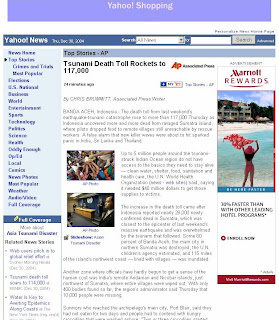Keyword advertising is a pretty cool invention. In theory, the underlying idea is very good and seems to make sense: you have a website covering a variety of topics, e.g. Yahoo! Finance or Google News. Whenever a user accesses a broader topic or a specific article of interest - say, you´re reading an article dealing with the delay of Leopard, the new version of Apple Inc.´s operating system -, an advertisement corresponding to that topic - e.g. an ad for Apple´s brand new iPhone (and incidentally one of the reasons why Leopard doesn´t make it into the stores now until fall) - is displayed. Or, you´re researching news on why European car sales a slowing, and you´re receiving an ad for the brand new Audi. The logical assumption is, of course, that you´re likely receptive for ads corresponding to news/articles on topics you´ve actively been looking for, promising greater success for the advertiser, who, in turn, will spend more money advertising on promising looking sites.
So the advertiser is happy, and the site being advertised on is, too (not to mention you, the happy user, because you receive ads tailored to your interests). The same holds true wether the website is Google, Yahoo!, or the site of a stray blogger trying to make a few extra bucks (or pennies) by allowing an advertising network to run their ads on their site. So much for the theory, which, as always, looks plausible enough.
Unfortunately, however, life is neither simple nor perfect, so in practice, things frequently tend to not work out quite as intended, and when it comes to keyword advertising, the results may be funny, annoying or outright bad taste.
Funny: Today, I visited this blog which the other day had an entry on atheism in which the author makes it very clear that she choses not to believe in religion or any higher beings, and that being belittled, not being taken serious or being otherwise hassled for this is - to put it politely - slightly annoying. Also, any attempts to try and convert her are not particularly appreciated. This morning (Central European Summer Time), I found an advertisement pointing to this site. How cool! There´s a post on atheism, and in response, the advertising network is trying to redirect and save you and your readers. Probably that´s a sign!
(N.B.: When I came back to the blog later, the above advertisement was no longer there; instead, there were two more appropriate ads, both by atheist forums or networks.)
Annoying: A couple of years ago, my boyfriend and a friend of his ran a website with a fair amount of traffic. They were members of an advertising network which rotated banners between different sites. One day during the bombings of former Yugoslavia in 1999, they had changed the homepage to include a peace message, calling upon all warring parties (i.e., the Serbians, the UCK, and the NATO states) involved in Kosovo and the former Yugoslavian republic to immediately refrain from all acts of aggression. Sure enough, on the very same homepage, next to the peace-banner, the advertising network in its infinite wisdom had placed an advertising banner promoting the German Army, which at that point was among those parties "involved" in former Yugoslavia. (After my boyfriend and his partner exchanged a couple of unfriendly comments with their contact person at the advertising network, it was agreed upon that both sides would be happier if their website would no longer be included in the ad network. Well, my boyfriend and his partner certainly did better without the network.)
Bad Taste: But the worst example of failed keyword advertising, or - worse - perhaps just plain thoughtless network advertising, I have come across so far was on a newssite covering the tsunami which hit the coastal shores of Indonesia, Sri Lanka, India and Thailand (among others, though the four countries named were the worst hit), on December 26, 2004, killing well over 200,000 people and leaving countless others homeless, probably for years to come. The article dealt with the death toll (then at well over 100,000), and with the fact that survivors in the region did not have access to the basics they needed to stay alive, such as shelter, food and clean drinking water. The ad next to the article, which promoted a hotel rewards program, displayed a palm-lined beach scene, very likely resembling what you´d have encountered in the region before the tsunami struck.
It´s fine to automate processes such as banner placement in a network. And yes, it would be too much effort to screen everything manually. But is it asking too much to perhaps refrain from advertising under certain circumstances? (In the immediate wake of September 11, we were watching CNN. And if I remember correctly, reporting on the tragic events was not interrupted by cheerful ads, especially not ones promoting air travel. At least for a couple of days.) Because, no matter what ad would have been placed next to that article, it would have been somehow inappropriate. Except for ads promoting donations, and/or aid for the regions affected.
Thursday, April 12, 2007
Keyword (And Other Network) Advertising
Posted by
Ragamuffin
at
11:33 AM
![]()
Subscribe to:
Post Comments (Atom)

No comments:
Post a Comment